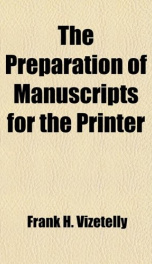the preparation of manuscripts for the printer

Purchase of this book includes free trial access to www.million-books.com where you can read more than a million books for free. This is an OCR edition with typos. Excerpt from book: IV RULES FOR THE SIMPLIFICATION OF SPELLING The following rules are recommended by the American Philological Association, the Spelling Reform Association, and the Philological Society of England, and are included here to serve as guides to authors and others in sympathy with the efforts being made to secure a logical and simpler form of orthography. All words affected by these rules are to be found in the vocabulary of the "Standard Dictionary"; in recording the new phonetic forms the editor has not introduced any theories of his own. Rule i (1) Change final " ed " to " t" when so pronounced, as in abashed (abasht), wished (wisht), etc., and, if a double consonant precedes, drop one of the consonants, as in chipped (chipt), dressed (drest), hopped (hopt), etc. (2) Retain final "ed" when the "e" afiects a preceding sound. () When the preceding vowel sound is long and expressed by a single letter, as the following: baked, not bakt, as bakt gaped, not gapt would be pronounced backed chafed, not chaft caked, not cakt coped, not copt craped, not crapt moped, not mopt draped, not drapt roped, not ropt N.B.The " e " does not affect the preceding vowel sound when expressed by two or more letters, as in booked (bookt), bleached (bleacht), crouched (croucht). (b) When a preceding " c " has the sound of "s," as in chanced (not chanct), forced (not forct), faced (not fact), etc. Rule 2 (1) Drop " ue " at the end of words when the preceding vowel is short or a diphthong, as in dialogs, catalogs, etc. Thus, spell dialog, catalog, demagog, epilog, synagog, etc. (2) Retain "ue" when the preceding single vowel is long, as in prorogue, vogue, disembogue, pirogue, plague, vague, fatigue. Rule 3 (1) Drop final "e" from words ending in "ite" when ...
Info about the book
Author:
Series:
Unknown
ISBN:
1110917805
Rating:
4.5/5 (2)Your rating:
0/5
Languge:
English
Users who have this book
Users who want this book
What readers are saying
What do you think? Write your own comment on this book!
write a commentif you like the preparation of manuscripts for the printer try:
Other books by this author
Do you want to exchange books? It’s EASY!
Get registered and find other users who want to give their favourite books to good hands!


